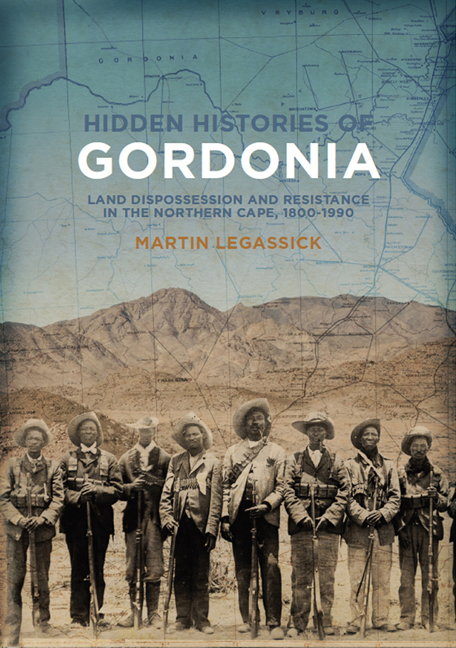Book contents
- Frontmatter
- Dedication
- Contents
- Acknowledgements
- Acronyms and abbreviations
- Illustrations
- Preface
- Chapter 1 The prehistory of Gordonia
- Chapter 2 The Baster settlement of Gordonia and its decline
- Chapter 3 The will of Abraham and Elizabeth September: a struggle for land in Gordonia, 1898–2014
- Chapter 4 From prisoners to exhibits: representations of Bushmen of the northern Cape, 1880–1900
- Chapter 5 South African human remains and the politics of repatriation: reconsidering the legacy of Rudolf Pöch
- Chapter 6 The early history of the brown Afrikaners in Riemvasmaak
- Chapter 7 The battle of Naroegas
- Chapter 8 The Marengo rebellion and Riemvasmaak, 1903–1907
- Chapter 9 The racial division of Gordonia, 1921–1930
- Chapter 10 Keidebees and Blikkies locations, Upington, 1894–1974
- Chapter 11 ‘All my powers have been swallowed by Upington’: the life and times of Alfred Gubula
- References
- Index
Chapter 11 - ‘All my powers have been swallowed by Upington’: the life and times of Alfred Gubula
Published online by Cambridge University Press: 20 April 2018
- Frontmatter
- Dedication
- Contents
- Acknowledgements
- Acronyms and abbreviations
- Illustrations
- Preface
- Chapter 1 The prehistory of Gordonia
- Chapter 2 The Baster settlement of Gordonia and its decline
- Chapter 3 The will of Abraham and Elizabeth September: a struggle for land in Gordonia, 1898–2014
- Chapter 4 From prisoners to exhibits: representations of Bushmen of the northern Cape, 1880–1900
- Chapter 5 South African human remains and the politics of repatriation: reconsidering the legacy of Rudolf Pöch
- Chapter 6 The early history of the brown Afrikaners in Riemvasmaak
- Chapter 7 The battle of Naroegas
- Chapter 8 The Marengo rebellion and Riemvasmaak, 1903–1907
- Chapter 9 The racial division of Gordonia, 1921–1930
- Chapter 10 Keidebees and Blikkies locations, Upington, 1894–1974
- Chapter 11 ‘All my powers have been swallowed by Upington’: the life and times of Alfred Gubula
- References
- Index
Summary
Born in 1934, Alfred Gubula has lived and worked in Upington since 1955 (apart from a brief period in South West Africa, where he was stabbed and partly paralysed by a fellow-worker). He has a virtually life-long identification with the ANC, and an unequalled length of activism in the area. Three of his family were among the residents of Paballelo convicted of the murder of a municipal policeman on 13 November 1985 in a trial which pushed the name of Upington into world prominence. He became chairman of the Paballelo Parents Committee then, and also a deacon in the African United National Baptist Church. This chapter is thus a reminder, from a new perspective, of the resistance to apartheid in Paballelo in the 1980s.
This story was told in the course of several tape-recorded interviews in 1993–4 in English – probably at most the ‘third language’ of Upington. These interviews were relatively open-ended and non-interventionist: ‘tell the story of your life, starting from the beginning’. My interventions were mostly to clarify dates, draw out context, pick up buried themes, and return to explore events in more detail. The weighting of significant events and sub-stories in this version of his life story, however, remains in my view Alfred Gubula's own. At the same time I have not hesitated to edit the transcript of the tapes, shortening, avoiding repetition, clarifying, changing the order of words and sentences in order to let the story flow. I have not always retained Alfred Gubula's style of English, except at key points. Oral narrative is a form different from written narrative, and the direct transcription of oral narrative, in my view, ceases to be oral narrative without becoming proper written narrative. Inevitably judgement is involved in editing: historical, political, sociological, literary judgement. The corrective to this judgement was to go over the written narrative with Alfred Gubula, for his approval.
From my day of being brought to earth by my mother I had to carry a heavy burden. I was born on June 15, 1934 in Lady Frere, in the Glen Grey district of the so-called Transkei which is of course part and parcel of the Union of South Africa.
- Type
- Chapter
- Information
- Hidden Histories of GordoniaLand dispossession and resistance in the Northern Cape, 1800–1990, pp. 343 - 380Publisher: Wits University PressPrint publication year: 2016



